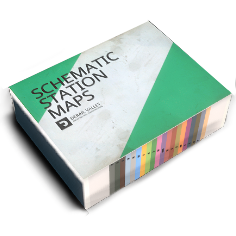Monitoring: Difference between revisions
importing old manual |
No edit summary |
||
| Line 2: | Line 2: | ||
<translate> | <translate> | ||
<!--T:1--> | <!--T:1--> | ||
The brake system can be monitored via brake gauges, typically located in the cab of a motorized vehicle. The main reservoir reading should always be high, up to 8 bar and it is automatically refilled by the compressor. Brake pipe operating pressures are between 3.5 bar when the brake is fully applied and 5 bar when fully released (since gauges display pressures relative to the atmospheric pressure, the actual absolute pressures are approximately 1 bar higher than indicated on the gauge). Brake cylinder pressure goes between 0 and 3.75 bar and represents the actual braking force applied to the wheels. As brake gauges are sometimes shared by multiple needles, the brake cylinder pressure is normally represented by a red needle on the brake pipe gauge. | The {{pll|Air Brake System Overview|brake system}} can be monitored via brake gauges, typically located in the cab of a motorized {{pll|Rail Vehicle Types|vehicle}}. The main reservoir reading should always be high, up to 8 bar and it is automatically refilled by the compressor. Brake pipe operating pressures are between 3.5 bar when the {{pll|Train Brake|brake}} is fully applied and 5 bar when fully released (since gauges display pressures relative to the atmospheric pressure, the actual absolute pressures are approximately 1 bar higher than indicated on the gauge). Brake cylinder pressure goes between 0 and 3.75 bar and represents the actual braking force applied to the {{pll|Brake Shoes|wheels}}. As brake gauges are sometimes shared by multiple needles, the brake cylinder pressure is normally represented by a red needle on the brake pipe gauge. | ||
</translate> | </translate> | ||
{{See also|Air Brake System Overview|Cylinder Leaks|Manual Cylinder Release|Train Brake|Independent Brake|Brake Shoes}} | {{See also|Air Brake System Overview|Cylinder Leaks|Manual Cylinder Release|Train Brake|Independent Brake|Brake Shoes}} | ||
[[Category:Air Brake System|6]] | [[Category:Air Brake System|6]] | ||
Revision as of 12:06, 7 March 2025
The brake system can be monitored via brake gauges, typically located in the cab of a motorized vehicle. The main reservoir reading should always be high, up to 8 bar and it is automatically refilled by the compressor. Brake pipe operating pressures are between 3.5 bar when the brake is fully applied and 5 bar when fully released (since gauges display pressures relative to the atmospheric pressure, the actual absolute pressures are approximately 1 bar higher than indicated on the gauge). Brake cylinder pressure goes between 0 and 3.75 bar and represents the actual braking force applied to the wheels. As brake gauges are sometimes shared by multiple needles, the brake cylinder pressure is normally represented by a red needle on the brake pipe gauge.
See also: Air Brake System Overview, Cylinder Leaks, Manual Cylinder Release, Train Brake, Independent Brake, Brake Shoes
